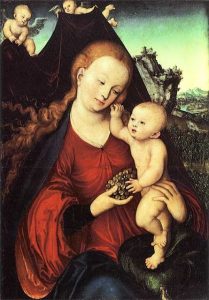“In my case, the pleasures of lovers which we shared have been too sweet–they cannot displease me, and can scarcely shift from my memory. Wherever I turn they are always there before my eyes, bringing with them awakened longings and fantasies which will not even sleep. Even during the celebration of the Mass, when our prayers should be purer, lewd visions of those pleasures take such a hold upon my unhappy soul that my thoughts are on their wantonness instead of on prayers. I should be groaning over the sins I have committed, but I can only sigh for what I have lost. Everything we did and also the times and places where we did it are stamped on my heart along with your image, so that I live through them all again with you.” Heloise to Abelard, Letter 4 in The Letters of Abelard and Heloise. Trans. Betty Radice, Revised edition by M.T. Clanchy (Penguin: London, 2003), p. 68 [Emphasis Added]
Can you believe the abbess of a convent wrote this? Wow. Memory and Love leave a lasting impression. Emotions often shape who we are and what we believe. While twelfth-century monks and nuns did write in very emotion-laded ways, these words had more specific meanings. Affectus can be translated as emotion, but it meant something else to a medieval nun or monk. In this case the affectus of love is powerful. It is a disposition or pull of the will toward someone or something.*
Notice that she knows the truth: “I should be groaning over the sins I have committed…” but she can only lament the loss of the love of her life.
In this quote we read Heloise, the abbess of a convent, describe the memory of her love for her husband and its effects on her in sexual terms. He was a famous theologian and philosopher: Peter Abelard. They had a torrid love affair when he was her teacher. She eventually became pregnant. To please her family, they were secretly married. Peter taught at the early twelfth-century cathedral school in Paris and this was a problem for them.
As master at a cathedral school, Peter held status as a cleric and celibacy was becoming quite important at that time. Heloise’s family decided that a secret marriage was not good enough, so a few of the family members castrated Peter Abelard. She became a nun at his insistence and he became a monk, but remained a significant (and controversial) theologian. Later she became an abbess of a monastery, the Paraclete, which Peter helped establish and supported.
In the same letter she acknowledges her hypocrisy and lack of virtue in her soul. While her outward behavior comported to the monastic ideal, she confesses the memory of sensual affections with her husband. Without the intention of loving God, Heloise, explains that her religious behavior is vanity. In fact, she explained that Peter, her husband and former teacher, was her real love and inspiration:
“At every stage of my life up to now, as God knows, I have feared to offend you rather than God, and tried to please you more than him. It was your command, not love of God, which made me take the veil. Look at the unhappy life I lead, pitiable beyond any other, if in this world I must endure so much in vain, with no hope of future reward.” Ibid., 69.
*William of St Thierry, The Nature and Dignity of Love, trans. Thomas X. Davis (Cistercian: Kalamazoo, 1981), 47.




